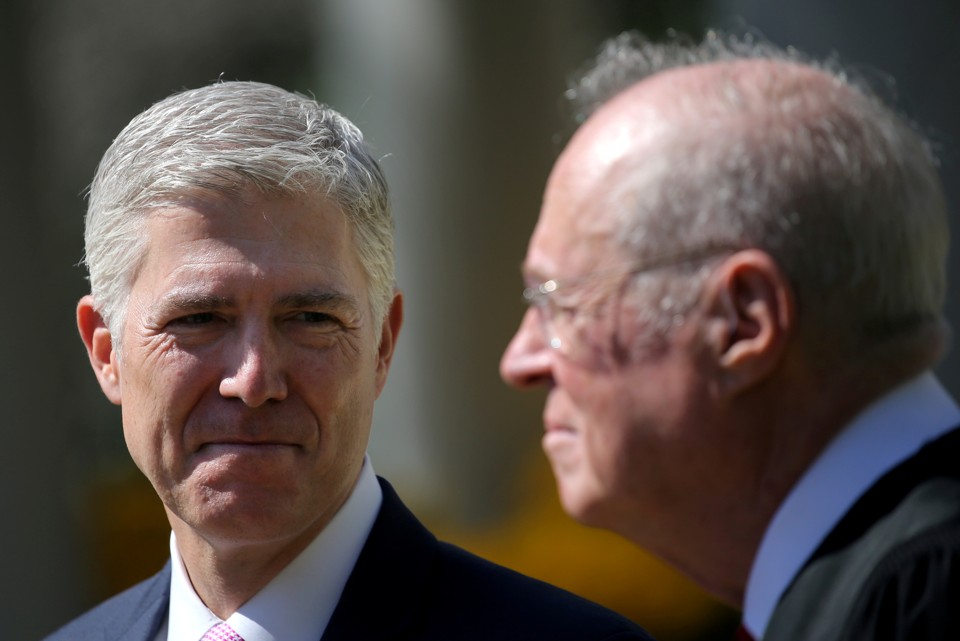The Supreme Court has ample reason to avoid deciding a case that could erode the Establishment Clause.

Carlos Barria / Reuters
GARRETT EPPS
APR 22, 2017
During argument in Trinity Lutheran Church v. Comer last week before the Supreme Court, Justice Elena Kagan mused that the case poses “a hard issue. It's an issue in which states have their own very longstanding law. It's an issue on which I guess I'm going to say nobody is completely sure that they have it right.”
The court did not pay much attention to a question that logically flows from Kagan’s concern: Is this trip really necessary?
GARRETT EPPS
APR 22, 2017
During argument in Trinity Lutheran Church v. Comer last week before the Supreme Court, Justice Elena Kagan mused that the case poses “a hard issue. It's an issue in which states have their own very longstanding law. It's an issue on which I guess I'm going to say nobody is completely sure that they have it right.”
The court did not pay much attention to a question that logically flows from Kagan’s concern: Is this trip really necessary?
LATEST FROM POLITICS

Why Is Jeff Sessions Attacking the Police?
Does the court really need to jump into this dispute between a church and a state government—or is it a case where the two parties basically have already kissed and made up?
Missouri’s Constitution, as written in 1875 and readopted in 1945, contains a provision that “no money shall ever be taken from the public treasury, directly or indirectly, in aid of any church, sect or denomination of religion.” The Missouri courts over the years have interpreted this provision quite literally. As a result, a church named Trinity Lutheran in Columbia, Missouri, was denied a state grant to resurface their daycare playground with recycled rubber tires. (The daycare would have been eligible if it had been run by a separate church-affiliated non-profit; but because in this case the money would have gone directly to the church, the provision applied.) The church sued, and the case has wended its way to the Supreme Court.
Apparently fearing a 4-4 split, the court delayed hearing the case for more than a year. Last week, Trinity Lutheran got its chance to explain to a full set of nine justices that the state’s constitution forces the church “to choose between exercising their religious faith and receiving a public benefit.”
The church was represented by David A. Cortman, senior counsel of the religious-right powerhouse Alliance Defending Freedom. I don’t question that ADF is deeply concerned about playground injury, but its agenda is broader. Much of its advocacy is concerned with creating religious-based exemptions to regimes of protection for LGBTQ people, with broadening the ability of Christian majorities to bring religion into public life and policy, and with empowering Christian parents in their dealings with public education.
Some 40 U.S. states maintain constitutional provisions like the one at issue in Trinity Lutheran. A victory for the church here might set up wins elsewhere on consequential issues like school voucher payments for religious schools—and exemptions for those schools from possible anti-discrimination laws involving sexual orientation and gender identity.
So a lot more is at stake than playground injury.
No one suggests that giving the church its grant would, by itself, violate the Establishment Clause. The issue instead is whether states can go beyond the clause and create a kind of “buffer zone” for their own funding programs without violating the church’s right to “the free exercise” of its religion.
The court in 2004 had held that the state of Washington, based on a state constitutional rule similar to Missouri’s, could refuse to fund a scholarship for a student who wanted to study theology. In that case, the state argued—and the Court agreed—that the Constitution did not require it to provide funds that would go directly to training a future pastor. In his opinion, Chief Justice William Rehnquist (no hater of public religion) wrote that “there are some state actions permitted by the Establishment Clause but not required by the Free Exercise Clause.” Whether that precedent applies in the case of a playground—which is not, itself, a place of worship at all—is a puzzling question. The earlier plaintiff wanted to use money directly for religious purposes; a playground, however, has little theological content.
But while the precedent this case may set is potentially significant, there’s some question about the specific stakes in Trinity Lutheran. It may be that, as Tallullah Bankhead once remarked of a Broadway play, “there is less in this than meets the eye.”
Consider: after the state denied the church’s grant application, Trinity Lutheran went to federal court in 2013. The church lost at the district level and at the court of appeals—and as the case dragged on, a political backlash developed against the state’s position. Last November, Missouri voters elected a new attorney general, Josh Hawley, whose campaign speeches criticized the denial of the church’s grant. Once elected, Hawley recused himself because he had actually done legal work in support of the church. The state’s deputy AG then asked outside counsel to defend the state’s position.
After that, the case sat in the court’s lobby like Frankie Five Angels for more than a year. The week before argument, the state’s new Republican governor, Eric Greitens, announced that the refusal of the grant money was “just wrong … So, today we are changing that prejudiced policy.”
From now on, Grietens announced, churches are eligible for playground grants. The court asked the parties for briefs on whether there was anything left to fight about. ADF said there definitely was. The attorney general’s office agreed with ADF—but it added something important. The governor’s new order, it noted, is quite likely to be challenged in court by Missouri citizens who believe it violates the “no funds” provision. And if that happens, the AG’s office will defend the new order as valid, and actively oppose the interpretation its designated counsel was about to argue to the Justices. The “state of Missouri” appearing before the court has, in essence, a population of one, former state solicitor general James R. Layton.Trinity Lutheran does still promise all of us a great ride—if you ignore the fact that the steering wheel is broken, the gas tank can’t be filled, and the brakes are shot.
Ordinarily, the court is quite meticulous in ensuring that cases that come before it are genuine “cases or controversies,” in which two sides genuinely disagree and something real is at stake. In Trinity Lutheran, however, we have a “controversy” between a church on one side and a state government on the other that officially wants the church to get everything it wants.
At oral argument last week, however, the justices seemed disposed to plunge ahead and decide this case as if it were real. I am a bit puzzled as to why.
As Adam Liptak memorably wrote in 2014, lawyers seeking a spot on the court’s docket often “sound a little like car salesmen.” That is, they try to convince the court that their particular case is a good “vehicle” to decide an important issues—that the issue is squarely presented, that there’s evidence in the record to allow the court to decide the issue, and that the two sides will argue it thoroughly and well. ADF certainly made that argument in its petition for certiorari: “This case presents an ideal vehicle for resolving the question presented, an important and longstanding question of federal law.”
Trinity Lutheran does still promise all of us a great ride—if you ignore the fact that the steering wheel is broken, the gas tank can’t be filled, and the brakes are shot.
The two parties last week invoked a doctrine called “voluntary cessation,” which says that one party can’t “moot” a case by simply deciding it won’t enforce a challenged rule—if it could later backtrack and resume the allegedly unlawful conduct. The ADF lawyers wrote, “A change in administration could readily lead to a resumption of the State’s former policy of excluding churches from the Scrap Tire Program or the Governor could simply change his mind due to political pressure.”
That is certainly theoretically possible; in the 2018 or 2020 elections, the mighty atheistic voting block might awaken in Missouri and demand new persecution of religious playgrounds. As a matter of law, then, the case really isn’t moot.
But that’s not the same thing as saying the court is now stuck and must decide it. The court has a procedure to use when a “vehicle” throws a rod; they dismiss the writ of certiorari as “improvidently granted.” (In law-nerd speak, this is called a “DIG.”) The latest edition of the practitioner’s bible, Supreme Court Practice by Stephen Shapiro and others, cites a case called The Monrosa v. Carbon Black, Inc., in which the court warned that “[e]xamination of a case on the merits, on oral argument, may bring into ‘proper focus’ a consideration which, though present in the record at the time of granting the writ, only later indicates that the grant was improvident.” The treatise adds that “a change in circumstances since the writ was granted may have lessened the importance of the case.”
DIGs are not all that rare—there’s usually at least one a term, and sometimes more. Trinity Lutheranseems like a good candidate for the honor. The people of Missouri, through their political representatives, have resolved the legal dispute. The new rule the state has adopted raises no federal constitutional concerns. Though some outside advocacy groups want the court to step in and void part of Missouri’s constitution, the people of the state are in the process of reinterpreting that provision to eliminate any possible conflict. The Missouri Supreme Court may, some time down the road, insist that the new interpretation is the wrong one—but it also might not.
Underlying this litigation is the unspoken claim that Missouri is a bastion of anti-religious bigotry. That seems to be an imaginary dragon, conjured for the purposes of litigation. Prudent justices might choose not to slay it.
No comments:
Post a Comment